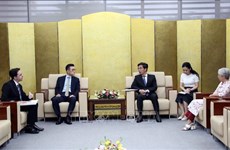Government budget supports gender equality
Budget spending for female workers at State offices or enterprises needs to be financially disclosed, Vietnamese experts and UN Women officials agreed at a seminar on gender equality.
 Ha Thi Thuy (right), deputy head of the National Key Laboratory for Plant Cell Biotechnology, teaches her students at the laboratory. (Photo: VNA)
Ha Thi Thuy (right), deputy head of the National Key Laboratory for Plant Cell Biotechnology, teaches her students at the laboratory. (Photo: VNA)Hanoi (VNA) – Budget spending for female workers at State offices or enterprises needs to be financially disclosed, Vietnamese experts and UN Women officials agreed at a seminar on gender equality in Hanoi on December 10.
The participants said that it was essential to raise awareness among leaders of State agencies and entrepreneurs about using the budget for female officials.
The seminar was jointly organised by the Ministry of Finance's National Institute for Finance, and United Nations Entity for Gender Equality and the Empowerment of Women.
A concept of "gender responsive budgeting" was defined as the process of planning and budgeting of the Government in an attempt to promote gender equality and to exercise women's rights.
A Government's gender responsive budgeting aimed to raise awareness among stakeholders of gender issues embedded in budgets and policies, to make governments accountable for translating their gender equality commitments into budgetary commitments, and to change budgets and policies to promote gender equality.
Nguyen Viet Loi, Director of the Finance Institute for Finance said the gender responsive budgeting had been becoming popular and produced the desired effect in many countries in the world, including Nepal, Australia, the Philippines.
The Vietnamese Government and ministries were interested in gender responsive budgeting but the implementation of such supporting policies is far from the target, Loi said.
Poor women could borrow loans from Vietnam Bank for Social Policies, he added.
The State had priorities and corporate income tax incentives for businesses that extensively use female workers.
Production, construction and transportation enterprises that hire 10 to 100 female labourers to account for more than 50 percent of all labourers enjoy reduced business income tax.
The Ministry of Education and Training had carried out free illiteracy eradication programmes for women aged 35 to 40 in ethnic minority areas and difficult socio-economic circumstances.
"Each ministry or economic sector must determine their big problems and outline tactical strategies," the institute director said.
Shoko Ishikawa, UN Women's Vietnam Country Representative said lack of attention to gender issues in policy analysis has limited the ability to mainstream gender in the formulation of policies and the allocation of adequate budgets.
In Vietnam, the majority of vocational training programmes for women are short term and usually focus on women's traditional occupations such as tailoring and garment making. These jobs were often low paid, leaving women disadvantaged compared to men regarding opportunities to access the labour market, she said.
The Vietnam's National Strategy on Gender Equality (2011-2020 term) was developed with seven objectives and 22 specific targets in many fields of politics, economy, labour and employment, education and training, health, culture, information and family. It also strengthens State management of gender equality.-VNA













